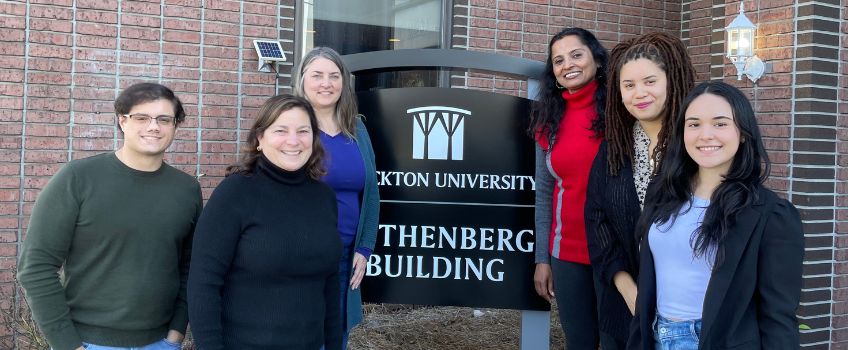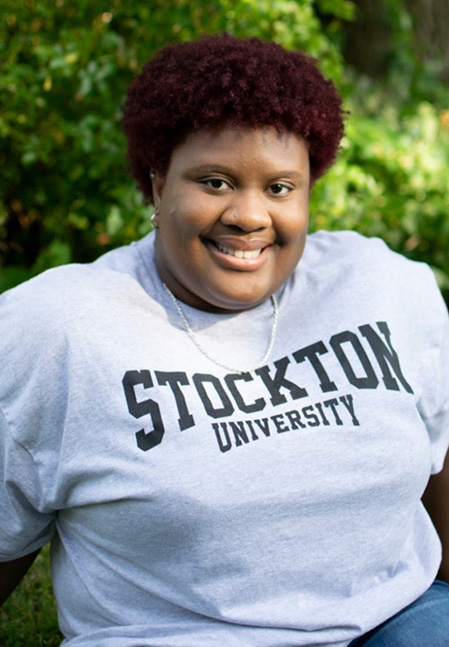Faculty, Students Evaluate Grantmaking for Postpartum Equity

From left, Alex Geffard, grant consultant; Alysia Mastrangelo, professor of Physical Therapy; Betsy Erbaugh, associate professor of Sociology; Sreelekha Prakash, associate professor of Health Science; Christina Jackson, associate professor of Sociology; and Diana Madrid, TES and Social and Behavioral Sciences alumna.
Galloway, N.J. – A group of Stockton faculty and student researchers are working together with the NJ Birth Equity Funders Alliance (NJBEFA) to evaluate philanthropic grantmaking for postpartum equity.
This initiative was born from a previous project faculty members of the team worked on addressing research related to First Lady of New Jersey Tammy Murphy's Nurture NJ (NNJ) campaign, specifically the need for a maternal and infant health center in Trenton.

Once this work was completed, the NJBEFA wanted to evaluate the effectiveness of their grantmaking through additional Stockton collaboration, resulting in grant funding for "Participatory Evaluation and Mutual Accountability for Equity in Postpartum Support" in the summer of 2023.
The team includes Christina Jackson and Betsy Erbaugh, associate professors of Sociology; Sreelekha Prakash, associate professor of Health Science; and Alysia Mastrangelo, professor of Physical Therapy. Prakash brings a clinical, public health, and epidemiology background, while Mastrangelo has a physical therapy/women's health and community wellness background.
Both Prakash and Mastrangelo said they felt the best part of this initiative is working with community partners to improve health outcomes and expand on maternal and infant health equity research.

Student researchers include Emma Rodriguez and Damaris-Anne Spring, both Sociology majors, and TES and Social and Behavioral Sciences alumna Diana Madrid, who majored in Psychology. Madrid is currently a grad applicant in Social Work.
"I think this project is important because it has equipped me with valuable hands-on research and community engagement experience as we uplift the voices and stories of Black women in their efforts to combat the Black maternal and infant health crisis," Rodriguez shared.
Spring reflected on how this experience has impacted her on both a personal and professional level. “By joining the research team, I knew it would be a great start for my career path because I would acquire a deeper knowledge of the way race and gender play into how people are perceived, not only from a legal point of view but from a medical point of view as well,” she said. “I’ve had a strong passion for advocating for individuals who face challenges in the health care system, and my personal experiences have fueled my desire to make a positive impact. I’m aware that maternal health disparities are a critical issue that intersects with various factors, including socioeconomic status, race, ethnicity and access to quality health care and my desire to address these disparities aligns with the broader goal of promoting equitable health care outcomes for all individuals, regardless of their background.”
"Given our community engagement expertise, experience in curriculum development, education and training, and extensive New Jersey-based mixed methods research in maternal/infant health and urban environments, Stockton has joined the Rutgers University maternal and infant health consortium," Jackson noted. "As a consortium, we applied to be the Lead Institution of Higher Education for the Maternal and Infant Health Innovation Center in Trenton, New Jersey."
In New Jersey, health care access and minority health outcomes are not the best, even in such a diverse state, since there are many racial and financial disparities. Our work is important because it focuses on improving gaps and works toward better health outcomes with on-the-ground organizations, universities, health providers, philanthropy and state government
As the team’s community engagement work continues to evolve, Jackson said the next steps will be to involve more faculty and students at Stockton. "We look forward to partnering with other academic and community partners in the state around birth equity."
Spring echoed the sentiments of the entire team when she shared, “By being a part of this collaborative, I can assist with stronger advocacy and the potential to influence policy changes.”
Reported by Mandee McCullough
Photos submitted


